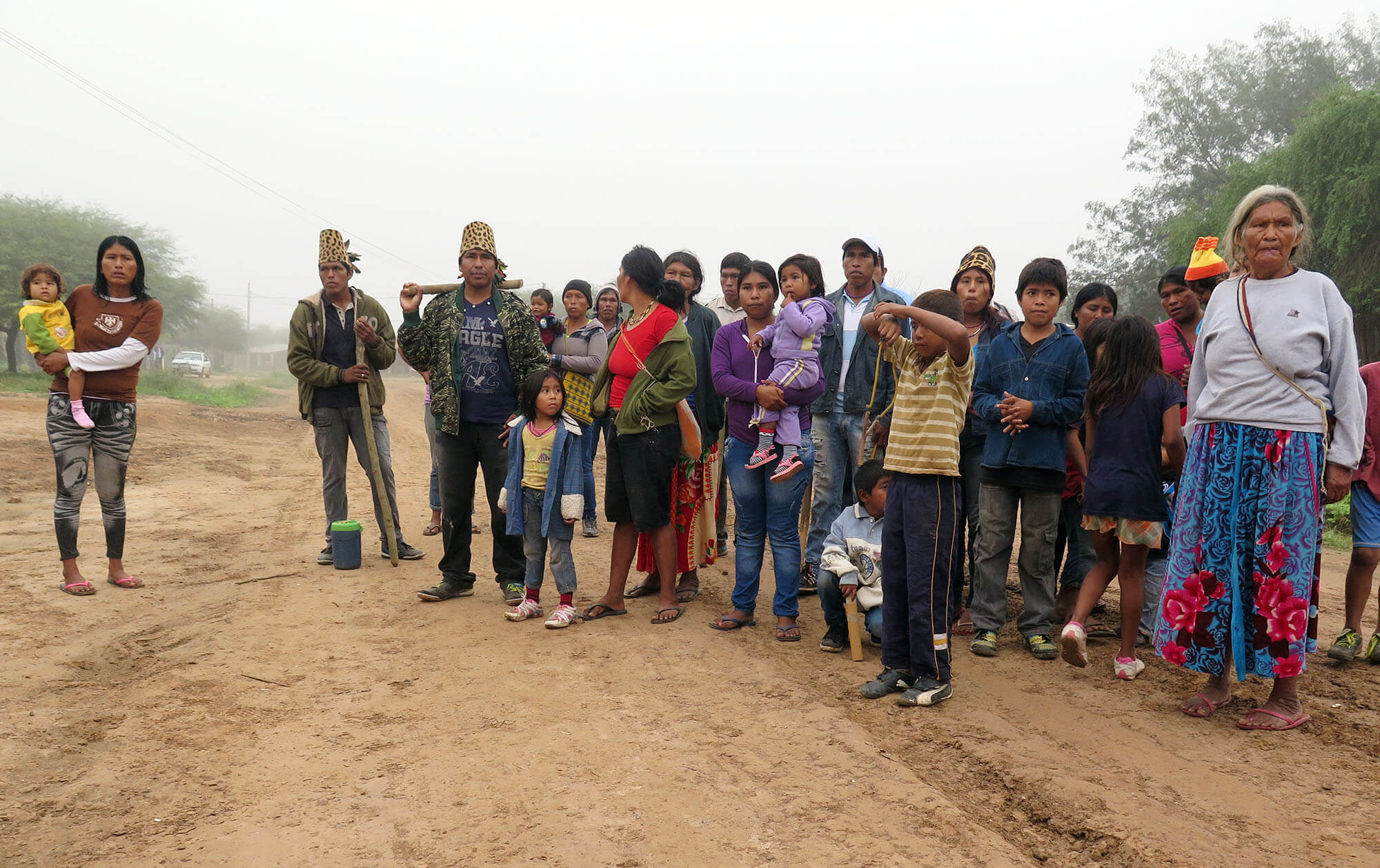
“We don’t care if our struggle involves going to prison or even dying. Our struggle is about justice because the land is ours and our children’s.” –Alejandro Servín
When Alejandro Servin and five others members of the Enxet Sur indigenous community Kelyenmagategma returned home after two days in the woods hunting and collecting honey, little did they expect to be showered with bullets.
“Three of us were walking ahead when we heard the shots, a bullet just missed me. We ran back into the forest to seek refuge but the employees of the estate managed to catch the youngest member of our group, Francisco, who was 14 years old at the time,” says Servín. “As a result all of us came out. Three hours later a contingent of police arrived, arrested us without a warrant and brought us – in the estate owner’s truck – to the nearest police station.”
Following their arrest, the six indigenous men were transferred to the capital Asuncion where they were held incommunicado for 48 hours without access to a lawyer or contact with their families. They were eventually charged with “theft of cattle” – a crime punishable by up to 10 years in prison under the Paraguayan Constitution. TierraViva – a human rights NGO that provides legal support and advocates for the land rights of indigenous communities in the Chaco region of Paraguay – eventually managed to get the charges dropped due to lack of evidence and the serious legal inconsistencies surrounding the arrest.
It is these as well as an array of other cases documented during more than 20 years of work in the Paraguayan Chaco that lead TierraViva to publish the first ever report on the situation of Human Rights Defenders. The report, released in December of last year, features case studies of illegitimate criminal charges, threats and acts of violence against 19 indigenous leaders and human rights lawyers working on land rights in the Chaco.
This arid forested region represents just over 60 percent of Paraguayan territory. It is inhabited by indigenous communities who know it as their ancestral land and private landowners who began to purchase estates from the 1940s onwards, denying the existence of those indigenous communities. This was the case for Kelyenmagategma: the company El Algarrobal SA bought land in 2002 that was inhabited by this Enxet Sur community.
In the past decade, land in the more populated eastern part of the country has become scarce leading to an expansion of the agricultural frontier into the Chaco. The rate of deforestation over the past five years has averaged 500 hectares (equivalent to 500 football fields) per day. In response to this alarming trend, indigenous communities have begun to organize and unite to secure legal title to parts of their ancestral lands to protect what remains of the unique Chaco ecosystem.
Despite the fact that the constitution of Paraguay recognizes the rights of Indigenous Peoples to their ancestral lands, according to Rodrigo Villagra Carron of TierraViva:
“What we see is an undeniable pattern of Government support for the interests of private landowners and the repression of those who defend human rights and national and international legislation related to the rights of Indigenous People.”
This was echoed by Cristina Coronel at the launch of the report in Asuncion in December:
“What this report reveals is [a] world where things are upside down… where indigenous communities and lawyers are defending universal human rights, but instead of protecting them, the police, public prosecutors and other representatives of the government protect the cattle ranchers and agro-industrial companies responsible for illegal deforestation and evictions of Indigenous People from their ancestral lands.”
This can clearly be seen in the case of Unine Cutamurajna from the Ayoreo community of Cuyabia who denounced illegal deforestation by Brandenstein Agro-Forest Investment (BAFI). Cuyabia acquired legal title to 25,000 hectares of land in 1996; but since then it is estimated the community has lost at least 6000 hectares due to land grabs by cattle ranchers. On one occasion, in 2015, the community hijacked a bulldozer that had been clearing vast tracts of forest on land belonging to them. Instead of investigating the illegal actions of BAFI, the Government of Paraguay sent a contingent of police to recover the bulldozer.he community has subsequently suffered threats from heavily armed private security guards working for the company.
“The Government sides with the cattle ranchers because they have money. We Indigenous People don’t have money,” says Unine. “But we will keep defending our land, it doesn’t matter if they continue to threaten us. We will not give up one more single piece of our ancestral land.”
Other cases in the report include:
TierraViva intends to use the report to carry out continued advocacy and raise awareness of the grave situation of human rights defenders in the Chaco.
According to Villagra Carron:
“This report is a condemnation of the structural inequality in Paraguay and a call to action. The cases documented in it are by no means exhaustive but just a few examples of what is happening in a broader context of rights deprivation. We urgently need to bring this situation and the government’s complicity and/or role in perpetuating it to public attention or the situation risks becoming even more dangerous, serious and unjust.”
The report received support from the Gran Chaco Ecumenical Small Projects Fund which works to strengthen the capacity of civil society organizations, groups and communities in the South American Chaco to transform the conditions of poverty and inequality and promote human rights.
To see the full report in Spanish click here.

Indigenous Peoples are putting their bodies on the line and it's our responsibility to make sure you know why. That takes time, expertise and resources - and we're up against a constant tide of misinformation and distorted coverage. By supporting IC you're empowering the kind of journalism we need, at the moment we need it most.